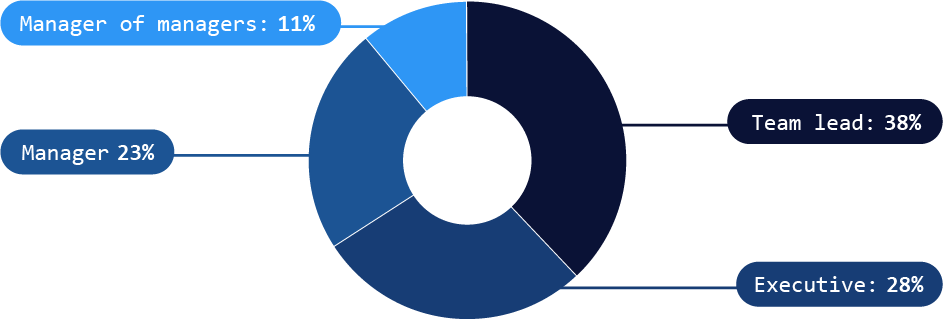




AI and budget pressure are rewriting the rules of tech leadership. Here’s what more than 280 South African tech leaders are saying — and what it means for your team.
AI and budget pressure are rewriting the rules of tech leadership.
Here’s what more than 280 South African tech leaders are saying —
and what it means for your team.

Leadership doesn't come with a manual. But it does come with pressure.
We surveyed 280+ South African tech leaders to uncover what leadership really looks like today: the invisible labour, trade-offs, and uncertainty – and the strategies leaders are using to help their teams thrive in the era of AI.
Get the full insights from 280+ tech leaders in South Africa
Download the reportTech leadership is more complex than ever. Beyond delivery, leaders must coach, maintain culture, and drive outcomes – often with little support or recognition.
"Leadership can be very lonely…
you sometimes have to make tough decisions for the business without anyone truly understanding your role."
– Adrien Erasmus
Co-founder, Warp Development

Many tech leads are promoted for their coding abilities based on the assumption that great coders will naturally be great leaders. Leadership growth is often reactive and unstructured, with most figuring it out as they go.
"You can read all the books you want, but leadership only clicks when you start doing it — usually getting it wrong first"
– Kurt Kruger
CTO at Antidote

AI may be transforming how teams work, but the biggest challenge that tech leaders face isn’t adoption: it’s retaining top talent and re-defining what 'great' engineers look like.
"The best developers now aren’t just the ones who can build fast — they’re the ones who can think critically about what to build at all."
– Anna McDougall,
Director of Engineering at Blinkist

97% of leaders report that their teams are using AI, but perceptions differ. Many leaders think AI is overhyped. Most say that it's increased the speed of code writing, but also moved the blockers downstream.
“It’s hard not to feel behind when every second headline is about AI changing everything. But as leaders, we still have to ask if it solves the problems we actually have."
– Riaan Nel,
Fractional CTO at GnoXus
 Find out how other teams are using AI
Find out how other teams are using AI.png)


Leading a tech team has never been more complex. From isolation and invisible work to AI-driven change and evolving hiring practices, tech leaders are navigating uncharted territory. This report shares insights from more than 280 South African tech leaders on how they’re managing teams, growing as leaders, and adapting to AI in the workplace.
Get actionable takeaways on:
Managing the emotional cost of leadership and burnout
Evolving team and delivery culture in the wake of AI
Hiring and retaining top engineers in an AI-driven world
We're helping tech leaders build, lead and inspire with clarity and confidence by sharing insights, hosting events, and creating spaces for peer learning. From reports like this one to mentorship initiatives, our goal is to help leaders navigate the challenges of modern tech leadership so they can build thriving tech teams.




🗓️ 5 February ⏰ 12:00 SAST ⏰ Online
Save your seat


OfferZen is South Africa's largest tech talent marketplace that connects job-seeking software, product, and data professionals with exciting opportunities at over 2000 companies.

Their role level

Their gender

Their experience in leadership roles

Their company size

OfferZen surveyed South African tech leaders to understand what’s really happening on their teams, and what support tech leaders need most. A total of 331 tech leaders took the online survey between 25 August and 15 September 2025. Of these responses, 292 were counted as valid.
Data was anonymised in accordance with GDPR guidelines and is housed separately from any and all of OfferZen’s platform data. Percentages may not always add to 100% due to rounding.
Responses to the following questions were used in the Engineering Leadership Report 2025.
Section 1: The reality of leadership
Leadership doesn’t come with a manual. But it does come with pressure. We’re curious about what it actually feels like to lead in tech right now. The messy, the meaningful, and the bits that never make it into the all-hands.
For rating-based questions, respondents were asked to select 1 if they strongly disagreed with the statement, 3 if they were neutral, and 5 for strongly agreed.
I feel isolated in my role as a tech leader.
My role requires me to juggle delivery, people management, and culture.
Managing people and strategy is a bigger challenge for me than technical complexity.
Retaining top talent is a big ongoing concern for me.
My role is misunderstood or undervalued in the company.
I feel more pressure to prove my team’s value than to lead them.
In your experience, what’s the hardest part of your role?
Section 2: Leadership skills and support
Leadership doesn’t come with a manual. But it does come with pressure. We’re curious about what it actually feels like to lead in tech right now. The messy, the meaningful, and the bits that never make it into the all-hands.
For rating-based questions, respondents were asked to select 1 if they strongly disagreed with the statement, 3 if they were neutral, and 5 for strongly agreed.
I feel well supported in my role.
I learn a lot from formal resources or training.
I learn a lot from other tech leaders.
My leadership growth has been mostly reactive and unstructured.
I was promoted into leadership primarily for my technical skills.
Tech leaders today need to stay hands-on with technology.
Tech leaders today need to stay hands-on with people.
My performance is primarily judged on measurable output.
My performance is primarily judged on people skills.
Rank the following based on what actually matters in your leadership role, from most to least important:
What’s one leadership skill or challenge you wish you had more support with?
What are your go-to sources, communities or people for learning?
Section 3: AI and hiring
Hiring has never been easy. But now it’s noisier, more expensive, and AI’s not necessarily helping. We’re trying to unpack what hiring really looks like when you’re in the thick of it, and what’s shifted in how leaders approach it.
For rating-based questions, respondents were asked to select 1 if they strongly disagreed with the statement, 3 if they were neutral, and 5 for strongly agreed.
The evolution of AI has changed how I think about hiring.
AI has made it harder to define what makes a “great developer”.
I’m hesitant to hire right now because I’m unsure how AI should change my team’s structure.
I’m hiring fewer juniors because of AI.
I need to prove a new hire provides more value than an AI solution before getting budget approval.
It has become harder to get headcount approval.
I value problem-solving skills more than pure technical skills in candidates due to AI.
When hiring candidates, I value their ability to leverage AI.
AI has improved the speed of our code delivery.
AI has improved the quality of our code delivery.
Which part of the hiring process frustrates you the most?
How has AI impacted how you think about team composition or team design if at all?
Beyond technical ability, what new skills are you prioritising for your team in an AI-first world?
Looking 5 years ahead, what’s the biggest change you expect in how software will be built, and what’s one thing you’re doing today to prepare?
Section 4: AI adoption and practical use
AI is everywhere: In headlines, in strategy decks, and maybe in your team’s code. But what does it actually mean for how you lead? We’re curious about the real impact (and chaos) behind the buzz.
For rating-based questions, respondents were asked to select 1 if they strongly disagreed with the statement, 3 if they were neutral, and 5 for strongly agreed.
My team is using AI at work.
Where is your team using AI the most?
Which AI tools is your team currently using?
I’m expected to measure AI’s impact before we’ve had time to experiment with it.
My team has adopted AI without resistance.
We’re using AI tools informally, without support from the business.
We’re using AI tools informally, without clear policies.
AI has increased the expectations on my team’s speed and output.
AI’s current capabilities are overhyped.
I feel pressure to adopt AI in my team.
We don’t have the time or clarity to adopt AI properly.
Engineers who resist using AI are starting to be seen as underperformers.
Security, legal, or compliance risks are blocking AI adoption in my team.
What do you wish more people understood about AI adoption in tech teams?